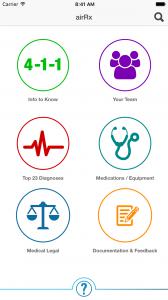Holiday Travel - Reducing Risk of In-Flight Medical Problems
Tips for reducing risk of in-flight medical problems + Smartphone App Available for Physicians Volunteering on In-Flight Medical Events
Many in-flight medical events occur when a traveler has a serious medical condition that is aggravated by airline travel."
PEORIA, IL, US, November 21, 2016 /EINPresswire.com/ -- Peoria, IL, November 21, 2016 – An estimated 44,000 in-flight medical events occur worldwide on commercial airlines each year – totaling approximately 120 events per day.* Holiday travelers can take steps to reduce the risk that they will experience a problem with their own health during their flights. — Dr. Raymond E. Bertino
“Many in-flight medical events occur when a traveler has a serious medical condition that is aggravated by airline travel,” explained Dr. Raymond E. Bertino, Clinical Professor of Radiology and Surgery at the University of Illinois College of Medicine and lead developer of airRx, the only smartphone app to prepare and help physicians volunteering to assist fellow travelers experiencing a medical event. “If you have a serious illness, check with your doctor to be sure air travel does not pose an increased risk.”
If a medical event does occur, initial emergency evaluation and medical care are often provided by a physician volunteer on the flight. Now, physicians who volunteer to help a sick traveler can use airRx to access 23 scenarios of the most common medical emergencies, with concise treatment algorithms and quick reference information to help evaluate and treat the patient.
Other tips for reducing the risk of travelers’ experiencing medical problems while in flight include:
1. Pack any medications you need in your carry-on and be sure they are clearly labeled, along with any medication allergies you may have.
2. Stay hydrated.
3. Make sure you are rested for flights and don’t assume you can catch up on your sleep while in flight.
4. Reduce the risk of blood clots by leaving your seat every couple of hours when the seat belt sign is off.
5. Don’t take sleep medications if you are also consuming alcohol while in flight.
6. Stay calm and don’t let travel delays or other problems stress you out.
“Staying hydrated is essential, especially on long flights,” continued Dr. Bertino. “I myself experienced a medical event while traveling because I neglected to follow that simple advice.”
Dr. Bertino led a team of experts in aerospace medicine, emergency medicine and ground support to develop airRx. With no formal physician training provided in medical school for handling in-flight events, airRx is designed to bridge the knowledge gap, providing a real-time checklist and quick reference handbook to improve the way that emergent medical situations in the air are addressed. airRx is provided by a non-profit organization and available for full use in Airplane mode after being downloaded from either the Apple App Store or Android Google Play for $4.99. (www.airrxmedical.com)
* Peterson et al., Outcomes of Medical Emergencies on Commercial Airline Flights, New England Journal of Medicine 2013;368:2075-83.(Department of Emergency Medicine, University of Pittsburgh School of Medicine)
# # #
Ed Stevens
Ed Stevens PR
727-412-1541
email us here

